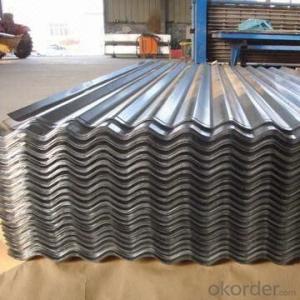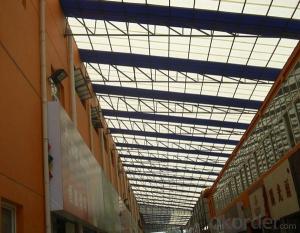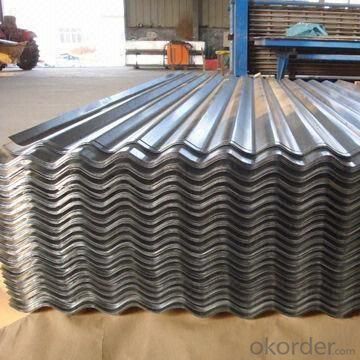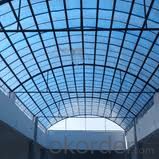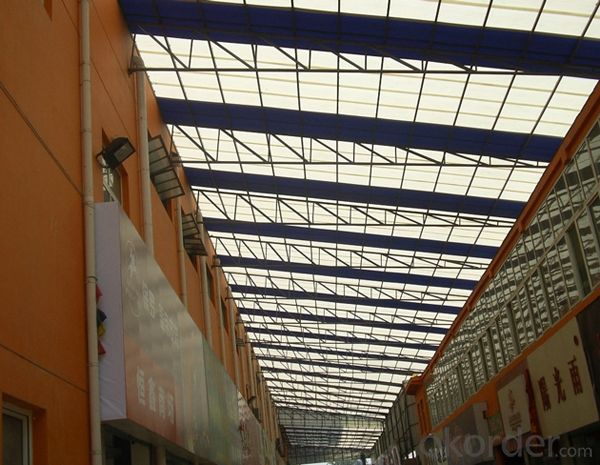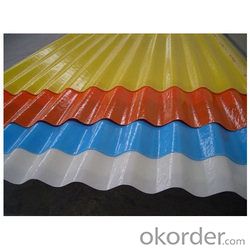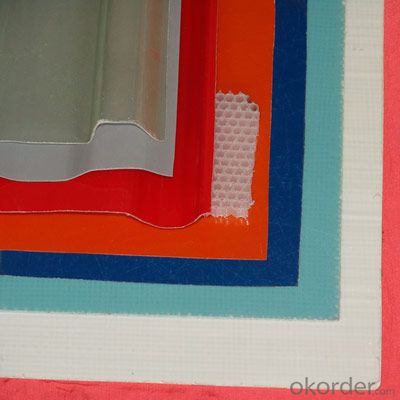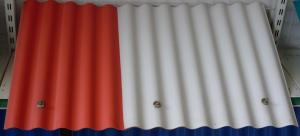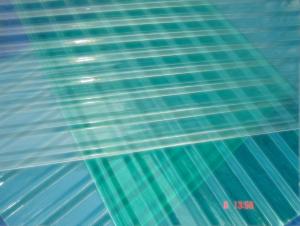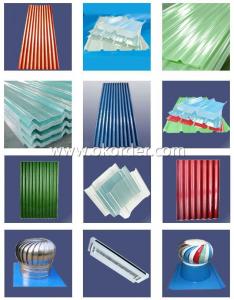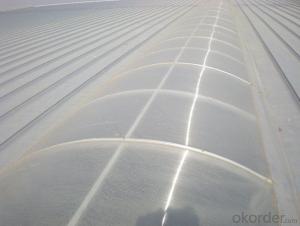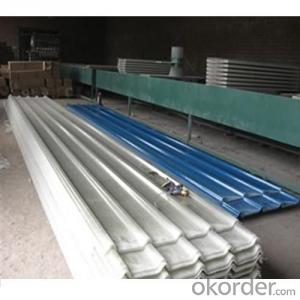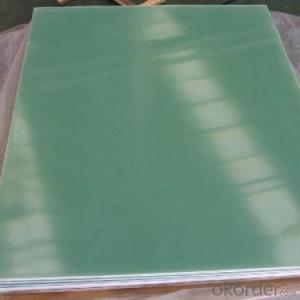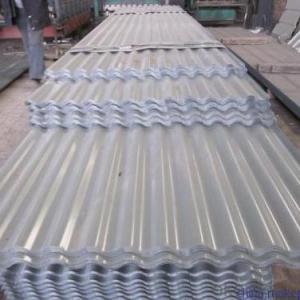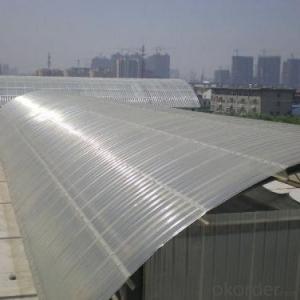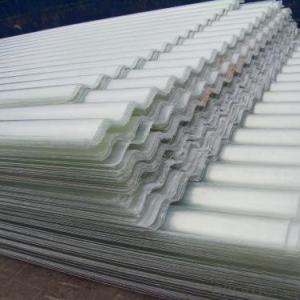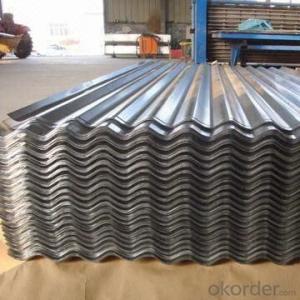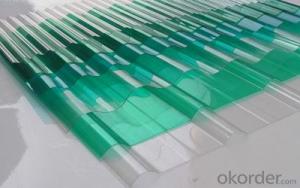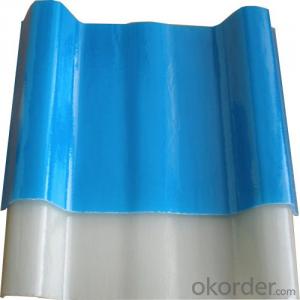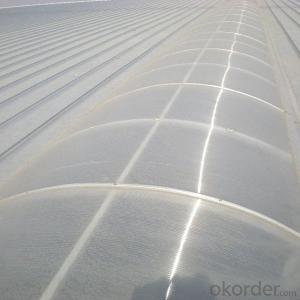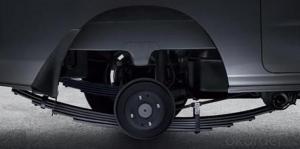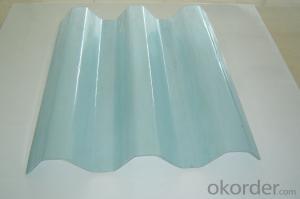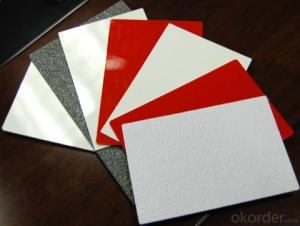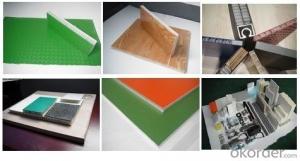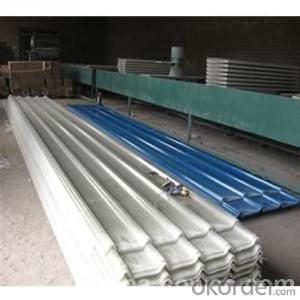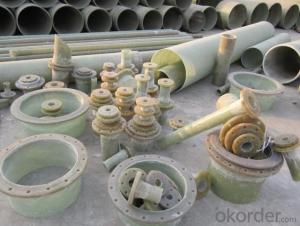FRP Roofing Panel - UV Blocking FRP Lighting Board, High Transmittance
- Loading Port:
- Shanghai
- Payment Terms:
- TT OR LC
- Min Order Qty:
- 200 m
- Supply Capability:
- 100000 m/month
OKorder Service Pledge
OKorder Financial Service
You Might Also Like
Specification
PRODUCT DESCRIPTION
FRP lighting board full name is Fibreglass Reinfored Polyester,is also named glass fiber reinforced polyester (FRP plate), glass steel, also called transparent tile. And steel structure supporting the use of natural lighting material, which is mainly composed of a high performance membrane, strengthen polyester and glass fiber group into.
FEATURES
1.corrosion resistance no rust, no maintenance, long service life.
2.lightweight, high strength pultrusion process molding FRP profiles have high glass fiber content (60%), the one way than intensity and stiffness is quite prominent, the density of glass fiber reinforced plastic is only about a quarter of the steel, light weight, very easy to handle, so as to reduce the handling fee.
3..Anti-fatigue high anti- fatigue strength, allowing repeated bending without permanent deformation.
4.anti-aging select highquality FRP pultrusion profiles, the service life of the product can reach more than 20 years, and in all the pultrusion FRP profiles were added in the formula of an-uv agent in order to get the best anti-uv effect.
5.excellent electromagnetic performance it has excellent electrical insulation, electrical, magnetic and electric spark can be used in risk conduction, sensitive to magnetic equipment area, and flammable and explosive place.
SPECIFICATION
Product | Item | Unit | Value |
FRP sheet | Thickness | mm | 1.0-2.5 |
Width | mm | <2500< span=""> | |
Length | mm | Customized or produce in roll | |
Density | g/cm3 | 1.45 | |
Tensile strength | MPa | 124 | |
Bending strength | MPa | 195.8 | |
Compression strength | MPa | 117 | |
Shear strength | MPa | 108 | |
Impact strength | KJ/m2 | 113 | |
FRP composite sheet | Core veneer thickness | mm | 20-100 |
FR4 thickness | mm | 1.2-2.5 | |
Width | mm | <2500< span=""> | |
Length | mm | <8000< span=""> | |
Thermal conductivity | Kcol/m2 | 0.57-0.117 |
PICTURES
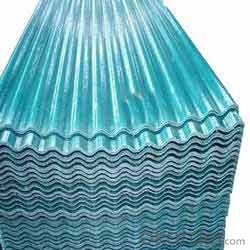
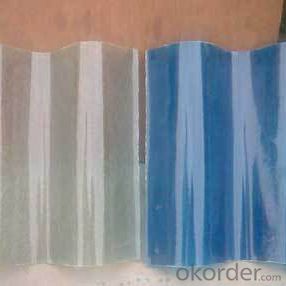
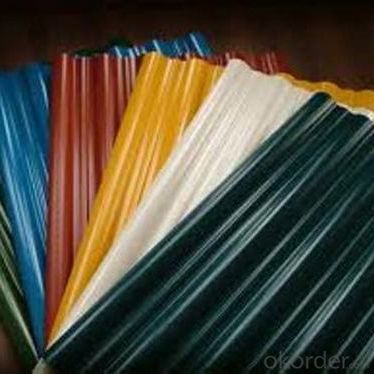
- Q: Can FRP roofing panels be installed on both residential and commercial car washes?
- Yes, FRP roofing panels can be installed on both residential and commercial car washes. FRP panels are a versatile roofing option that can withstand moisture, chemicals, and harsh weather conditions, making them suitable for car wash facilities of all sizes and types.
- Q: Can FRP roofing panels be used in cold climates?
- Yes, FRP (Fiberglass Reinforced Plastic) roofing panels can be used in cold climates. FRP roofing panels are known for their durability and ability to withstand extreme weather conditions, including cold temperatures. They have excellent thermal insulation properties, which help to prevent heat loss and keep the interior of buildings warm. Additionally, FRP panels are resistant to damage caused by freezing and thawing cycles, making them a suitable choice for cold climates where temperature fluctuations are common. However, it is important to ensure proper installation and maintenance of FRP roofing panels to maximize their performance and longevity in cold weather conditions.
- Q: Are FRP roofing panels suitable for office buildings?
- Yes, FRP (Fiberglass Reinforced Plastic) roofing panels are suitable for office buildings. FRP panels have several qualities that make them a popular choice for commercial structures. Firstly, FRP panels are lightweight yet durable, making them easy to install and maintain. This is advantageous for office buildings, as it reduces the need for extensive structural modifications and allows for faster construction or renovation processes. Secondly, FRP panels offer excellent resistance to harsh weather conditions, including UV rays, extreme temperatures, and high winds. This is crucial for office buildings, as they are often exposed to the elements and need a roofing material that can withstand long-term exposure without deteriorating or requiring frequent repairs. Additionally, FRP roofing panels are available in various colors, finishes, and designs, allowing for aesthetic customization to suit the architectural style and branding of the office building. This versatility makes FRP panels an attractive option for businesses looking to enhance the visual appeal of their office space. Furthermore, FRP panels are known for their energy efficiency. They have excellent insulation properties, which help regulate the temperature inside the office building, reducing the reliance on heating and cooling systems and ultimately lowering energy costs. Lastly, FRP roofing panels are cost-effective compared to other roofing materials. They have a long lifespan and require minimal maintenance, resulting in reduced long-term expenses for the office building owner. In conclusion, FRP roofing panels are a suitable choice for office buildings due to their lightweight yet durable nature, resistance to harsh weather conditions, aesthetic versatility, energy efficiency, and cost-effectiveness.
- Q: What is the installation process for FRP roofing panels?
- Typically, the installation process for FRP (Fiberglass Reinforced Plastic) roofing panels involves the following steps: To begin, the roof surface must be thoroughly cleaned and prepared for installation. This may include the removal of existing roofing materials, cleaning the surface, and ensuring it is smooth and clear of any debris or protrusions. Accurate measurements of the roof are then taken to determine the required size and number of FRP panels. These panels are subsequently cut to the appropriate dimensions using a saw or similar cutting tool. It is important to wear safety glasses and gloves when cutting FRP panels for protection. Next, the first panel is positioned at the edge of the roof and securely fastened using suitable fasteners such as screws or nails. The subsequent panels are then overlapped with the previous one and also fastened down in a similar manner. This overlapping technique ensures a watertight seal and prevents any water infiltration. Once all the panels are successfully installed, any gaps or joints between them are sealed using a suitable sealant. This further enhances the waterproofing properties of the roof. Additionally, trim pieces may be used to cover exposed edges or corners, providing a more polished appearance. To ensure a proper and durable installation, it is crucial to carefully follow the manufacturer's instructions and guidelines. If you are unfamiliar with the installation process or have any doubts, it is recommended to consult with a professional or experienced contractor.
- Q: Are FRP roofing panels resistant to damage from high temperatures?
- Yes, FRP roofing panels are highly resistant to damage from high temperatures. FRP stands for Fiberglass Reinforced Plastic, which is a composite material that is specifically designed to withstand extreme temperature conditions. These panels are manufactured using a combination of fiberglass and resin, which gives them excellent thermal stability and resistance to heat. FRP roofing panels have a high melting point and do not warp, crack, or deteriorate when exposed to high temperatures. They are commonly used in industrial and commercial settings where there is a need for heat resistance, such as factories, warehouses, and chemical plants. Overall, FRP roofing panels are a reliable and durable choice for protecting structures from heat-related damage.
- Q: Can FRP roofing panels be used for solariums?
- Solariums can indeed utilize FRP roofing panels. FRP, an acronym for fiberglass reinforced panels, is a well-liked roofing option due to its lightweight, durability, and resistance to weather conditions. These panels are specifically designed to endure harsh weather and are frequently utilized in commercial and industrial settings. When it comes to solariums, FRP panels offer numerous benefits. They enable the passage of natural light, resulting in a bright and inviting atmosphere. Moreover, these panels provide excellent insulation, ensuring a comfortable temperature within the solarium. Additionally, FRP panels are resistant to UV rays, safeguarding furniture and plants from fading or damage. It is crucial to highlight that the design and installation of FRP roofing panels for solariums should be carried out by experienced professionals well-versed in both roofing and solarium construction. Proper installation techniques, including joint sealing and ensuring adequate drainage, are vital to prevent leaks and water damage. To conclude, FRP roofing panels are a suitable choice for solariums due to their durability, resistance to weather conditions, insulation properties, and ability to allow natural light into the space. Nonetheless, professional installation is imperative to ensure the panels are correctly installed and sealed, minimizing any potential issues.
- Q: What colors are available for FRP roofing panels?
- FRP roofing panels are available in a variety of colors, including but not limited to white, gray, green, blue, and translucent options.
- Q: Do FRP roofing panels have any specific insulation properties?
- FRP roofing panels possess distinct insulation properties that are well-known in the construction and roofing industries. These panels are favored for their exceptional insulation capabilities, which contribute to energy savings and create a more comfortable indoor environment. The insulation properties of FRP panels stem from their material composition. The inclusion of fiberglass reinforcement not only enhances their strength and durability, but also acts as a thermal insulator. Moreover, the plastic resin matrix employed in FRP panels exhibits low thermal conductivity, indicating its poor heat conduction capabilities. Consequently, this property minimizes heat transfer through the panels, effectively preventing heat from entering or escaping the building. Regarding specific insulation values, FRP panels typically boast high R-values, which signify their thermal resistance. The R-value measures how effectively a material resists heat flow, with higher values representing superior insulation. Depending on the product and manufacturer, FRP panels can have R-values ranging from approximately 3 to 6 per inch of thickness. In conclusion, FRP roofing panels undeniably possess specific insulation properties. The combination of fiberglass reinforcement and plastic resin matrix ensures outstanding thermal insulation, resulting in temperature regulation and reduced energy consumption in buildings.
- Q: Are FRP roofing panels compatible with different roofing underlayments?
- Yes, FRP roofing panels are compatible with different roofing underlayments. They can be used with various types of underlayments such as asphalt felt, synthetic underlayment, or self-adhering membranes. However, it is important to consult the manufacturer's guidelines and specifications for proper installation and to ensure the compatibility of the specific underlayment with FRP roofing panels.
- Q: Can FRP roofing panels be used in areas with frequent hailstorms?
- FRP roofing panels are capable of being utilized in regions that experience frequent hailstorms. They possess a reputation for being durable and resistant to impacts, which renders them an appropriate selection for areas that are susceptible to hailstorms. These panels are specifically designed to endure inclement weather conditions, including hailstorms, owing to their resilient and robust composition. The inclusion of fiberglass reinforcement within FRP roofing panels provides them with added strength and resilience, allowing them to withstand hail impacts without sustaining significant damage. Furthermore, FRP panels are characterized by their lightweight nature, ease of installation, and low maintenance requirements, thereby making them a practical choice for regions that frequently face hailstorms. However, it is imperative to select FRP panels of suitable thickness and quality in order to ensure optimal resistance against hail.
Send your message to us
FRP Roofing Panel - UV Blocking FRP Lighting Board, High Transmittance
- Loading Port:
- Shanghai
- Payment Terms:
- TT OR LC
- Min Order Qty:
- 200 m
- Supply Capability:
- 100000 m/month
OKorder Service Pledge
OKorder Financial Service
Similar products
Hot products
Hot Searches
Related keywords
